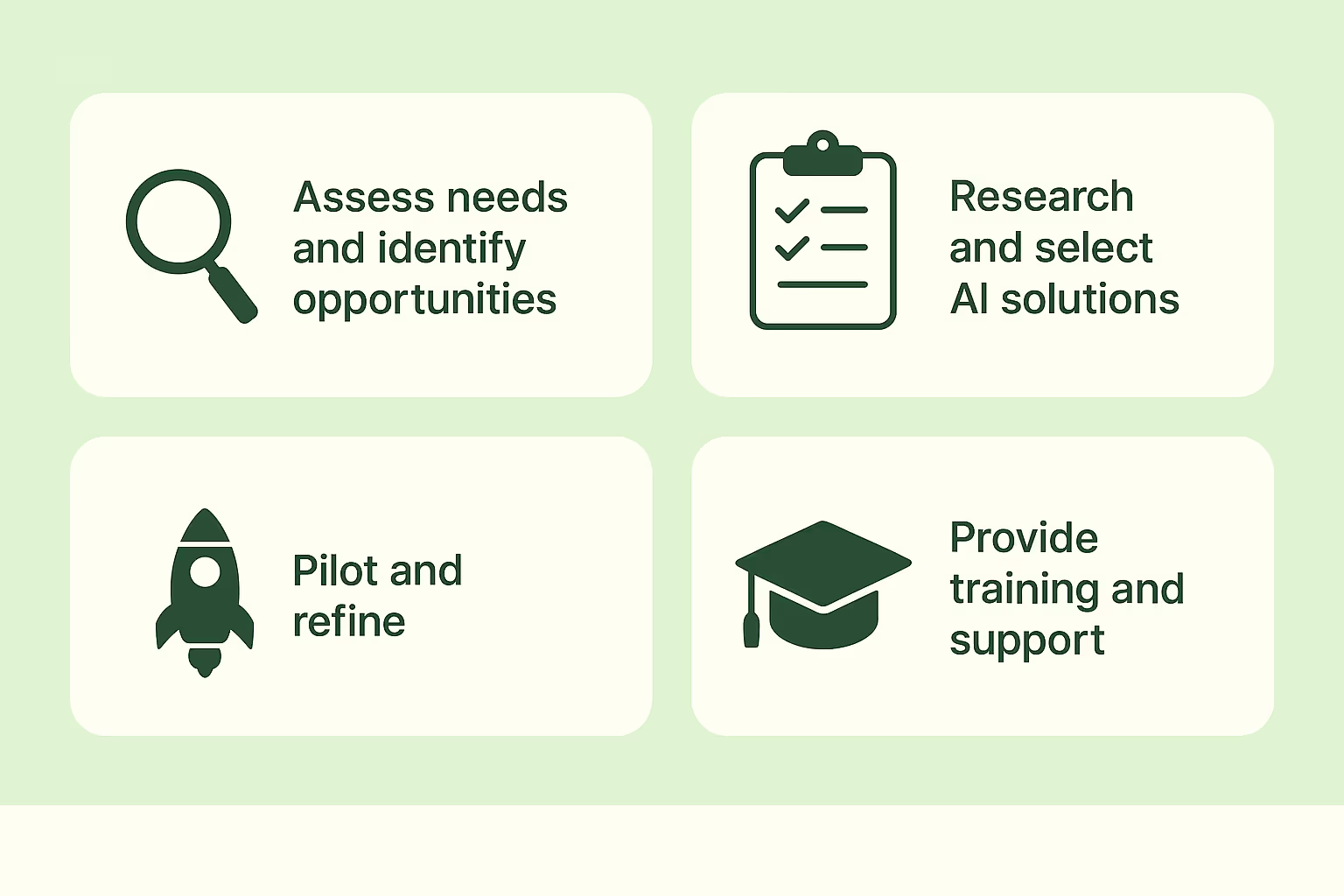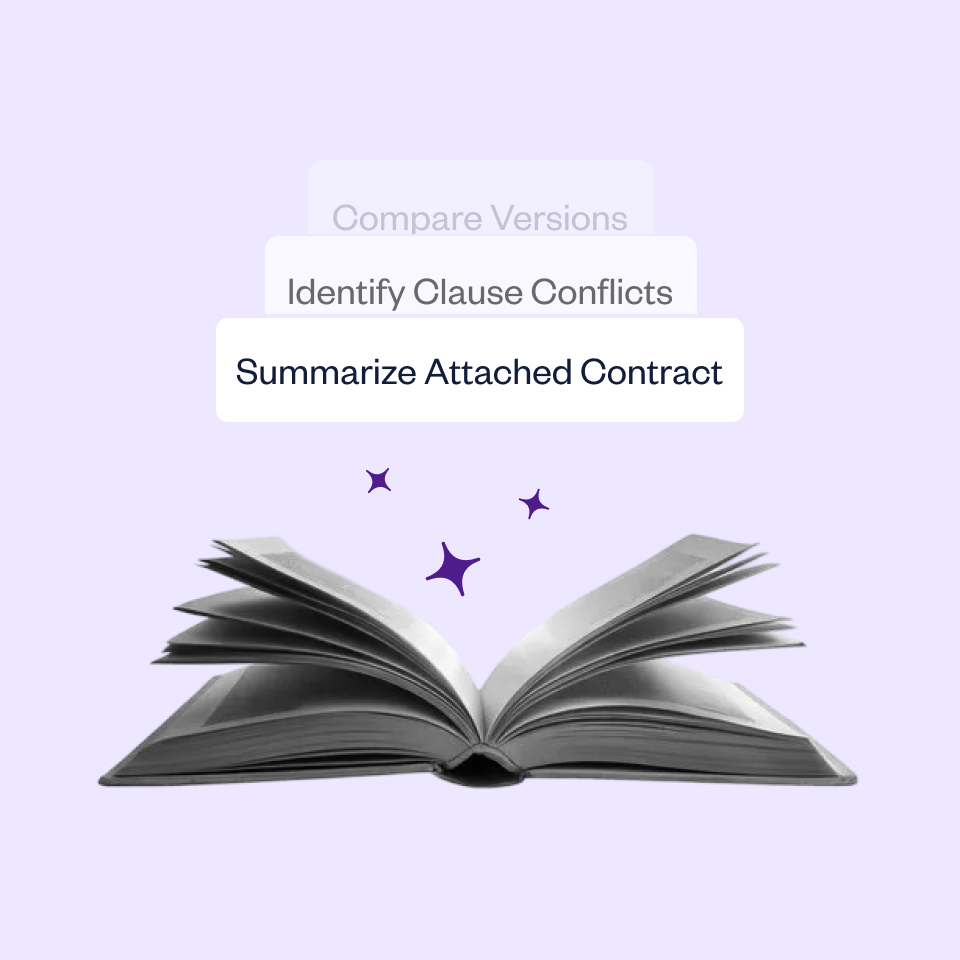(Updated on 29th May, 2025)
When ChatGPT first went live for public use in November of 2022, it was met with massive global interest. Soon, many lawyers and in-house legal teams realized its potential in analyzing complex legal issues, reviewing extensive documents, and generating accurate legal content in a matter of seconds.
Of course, these realizations also raised questions about the future of in-house legal counsel. Will AI replace lawyers and render them obsolete? The short answer is “No.”
AI's cost-effectiveness and ability to minimize errors make it an appealing option. However, issues surrounding confidentiality, security, and accuracy render AI a poor replacement for human lawyers.
The optimal solution is to have legal professionals implement AI as a tool to support their work.
The call for AI
In-house legal departments are the backbone of businesses and organizations. Without the legal department’s role in contract management, compliance, regulatory matters, litigation support, and legal advice, any organization is doomed to fail.
Despite their crucial role, in-house legal departments encounter numerous challenges, especially when it comes to contract management. Laborious and time-consuming processes—such as manual contract drafting, review, and tracking—are what slow legal down, not to mention the risks associated with not paying attention to detail. Modern legal demands call for streamlined and automated contract management processes that reduce reliance on manual tasks.
To address these needs and overcome the limitations faced by in-house legal departments, lawyers have started embracing innovative technologies, particularly AI-driven solutions.
AI is already here
Many attorneys are actually already using AI in their daily lives in the form of popular devices like Amazon’s Alexa and Apple’s Siri, which utilize natural language processing. This branch of AI applies machine learning and other technologies to text or speech, enabling computers to understand and respond to spoken or written words.
Continuing advancements in legal AI, such as automated contract cutting and pasting, now make it possible to use machine learning in your day-to-day legal tasks.
AI ethical and professional considerations

Rather than being threatened by the rise of AI, legal teams have the opportunity to embrace it and evolve alongside this transformative technology. However, there are ethical and professional concerns that legal practices and departments must consider.
To truly maximize the benefits of AI in the legal field, it is crucial to foster a symbiotic relationship between AI, automation, and legal expertise. While AI excels in processing and analyzing data, legal professionals must bring their nuanced understanding of the law, context, and ethical considerations to safely use this technology.
Legal professionals should prepare to provide the necessary guidance and oversight to ensure that AI systems are aligned with legal requirements, ethical standards, and business objectives. The key is to train AI models, thus ensuring fairness and transparency in AI-driven decision-making. A premier AI model will come trained on unbiased, ethically sourced data.
The main hurdles to safely implementing AI for legal work include cost, ethics, pushback, and best use.
Also explore: AI playbook
#1 Cost
Implementing AI technologies, such as sophisticated contract management systems or AI-powered legal research tools, often requires a significant financial investment. These costs include not only the initial purchase or licensing fees but also ongoing maintenance, training, and integration with existing systems.
#2 Ethical considerations
AI technologies rely on algorithms and data to make decisions, which raises concerns about bias, fairness, and the potential for discrimination. Legal professionals have an ethical duty to ensure that AI systems are transparent, unbiased, and comply with legal and ethical standards. This means teams are responsible for actively working with ethical AI companies that protect user data.
#3 Change management
Introducing AI into legal teams requires a significant shift in mindset and working practices. Change management becomes a crucial hurdle to overcome to ensure successful AI adoption. Resistance to change, fear of job displacement, and unfamiliarity with AI technologies can hinder the adoption process.
You need to showcase the benefits of AI adoption transparently, emphasizing how AI technologies can enhance your team’s work rather than replace them.
#4 Poor usage
AI may be able to help lawyers, and it may be faster at summarizing than lawyers. However, AI cannot replace lawyers, and asking it to act as a lawyer has resulted in failure.
For example, when asking Large Language Models (LLMs) to create arguments responding to unprecedented legal cases, the AI will often hallucinate. This is a response that appears plausible but is incorrect, misleading, or nonsensical and is not supported by facts or logic.
AI should not be used to:
- Provide legal advice
- Create client-specific legal strategy
- Form attorney-client privilege
- Represent clients
- Provide legal accountability
- Exercise ethical reasoning
- Provide up-to-date legal information
Also read: AI Contract Analysis: Saving Time and Increasing Efficiency
Also read: Will AI Replace Paralegals?
Where AI excels: Contract management

AI, with its unlimited capabilities, is unleashing a new era of efficiency and effectiveness in contract management processes. Its ability to analyze and interpret vast amounts of data, extract relevant information, and make intelligent decisions has the potential to transform the landscape of contract management.
Sterling Miller, CEO of Hilgers Graben PLLC, said, “The combination of these benefits [enhanced productivity at low cost] will allow in-house legal departments to actually deliver on the old CEO/CFO demand of ‘doing more with less.”
With AI, legal teams can automate routine tasks, gain insights from contract data, streamline the entire contract lifecycle, and much more.
#1 Enhanced speed and efficiency in contract analysis and review
AI-powered contract analysis tools can quickly review and analyze contracts, extracting key terms and clauses with remarkable accuracy. This document review saves significant time and effort compared to manual review, enabling legal teams to focus on higher-value tasks. AI algorithms can also identify potential risks, inconsistencies, or non-compliance issues, allowing legal professionals to address them proactively. Lawyers who generate detailed and specific prompts are more likely to get these quality results.
#2 Advanced contract drafting and negotiation with AI-powered tools
AI can assist in the contract drafting and negotiation process by providing intelligent suggestions and recommendations based on predefined rules and historical data. AI-powered tools can analyze existing contracts, identify standard clauses, and propose revisions or alternative language. This legal tech accelerates the negotiation process and can reduce errors.
Also read: The Current State of AI for Legal: Benefits, Challenges and Top Tools
#3 Real-time contract monitoring and risk assessment
AI enables real-time contract monitoring and risk assessment by continuously monitoring contract performance, obligations, and key dates. It can provide alerts for critical events, such as renewal dates or termination clauses, ensuring that legal teams stay on top of their contractual obligations.
AI-powered risk assessment algorithms can analyze contracts to identify potential legal, financial, or reputational risks, allowing legal departments to mitigate them proactively.
Also read: How to Review Employment Contracts: A Comprehensive Guide
Also read: Generative AI for Contract Management: Best Practices to Ensure Safety
How legal teams can evolve with AI

When it comes to implementing AI technology, there’s often apprehension among legal professionals who may fear that AI will replace lawyers or disrupt established workflows. However, creating a culture of innovation involves encouraging experimentation and rewarding creative thinking.
Here’s insight into this phenomenon from David Lancelot, ex-VP Global Head of Legal, eBay Classifieds,
“The simplest piece of advice I could give to anybody, in business or otherwise, is to create that [creative and innovative] headspace; Take a step back, open your mind to the possibility of doing things in a more modern and effective way.”
You must empower your teams to explore AI software, test their applicability, and share their findings with colleagues. By fostering a supportive and collaborative environment where ideas are valued and experimentation is encouraged, legal teams can embrace the AI revolution with enthusiasm.
Integrating AI legal technology into contract management processes also requires a systematic approach. Here are some practical steps that in-house legal teams can take to successfully incorporate AI:
#1 Assess needs and identify opportunities
Begin by assessing the specific pain points and challenges in contract management that AI can address. This could include tasks such as legal analysis, review, due diligence, and risk assessment. Identify the areas where AI can add the most value and prioritize them for implementation. Look for workflows where legal strategy is less needed and repetitive tasks take up time.
#2 Research and select AI solutions
Conduct thorough research to identify AI solutions that align with your identified needs and goals. Consider factors such as functionality, ease of integration, scalability, and vendor reputation. Engage in demos, trials, and pilot projects to evaluate the effectiveness and suitability of different AI tools.
For instance, SpotDraft AI helps you unlock a new level of productivity and gain valuable insights from your contracts while using the platform for contract drafting or information extraction.
With SpotDraft, you can:
- Generate contract templates instantly
- Conduct comprehensive due diligence on multiple contracts at once, and review contracts 7x faster with AI clause match
- Extract critical insights from your contracts, empowering better decisions across your organization
- Compare clauses with past versions side by side, and make quick changes
- Generate precise contract summaries to identify data trends and facilitate decision-making
Moreover, using our Microsoft Word plugin, Draftmate AI, you can turn any document into a SpotDraft contract template in under 5 minutes.
#3 Pilot and refine
Start with small-scale pilot projects to test the selected AI solution within the contract management process. Monitor its performance, gather feedback, and make adjustments as needed. This iterative approach allows for continuous improvement and ensures that the AI solution aligns with the team's requirements.
Also read: Same Goals, New Approach: Exploring AI in Legal Operations
#4 Provide training and support
Offer comprehensive training to your team on how to effectively use the AI tools integrated into the contract management processes. Ensure that they understand the capabilities, limitations, and best practices associated with AI technology.
Also read: Alternative Legal Careers for Lawyers: 20 Realistic Ideas
Human expertise + AI technology = High-functioning legal team
Legal expertise is essential in interpreting nuanced legal concepts, understanding complex business contexts, and making strategic decisions. AI can provide data-driven insights and process large volumes of information, but it is the legal professionals who bring critical thinking, ethical judgment, and contextual understanding to the table.
As awareness grows and understanding deepens, perceptions of AI in legal departments are likely to evolve. Regardless of the size of your legal department, embracing AI technology can bring numerous benefits, including improved efficiency, streamlined processes, and valuable insights for decision-making.
It is important to foster an environment where lawyers can actively contribute to the development and improvement of AI systems. This collaboration ensures that AI technologies align with legal requirements, ethical standards, and the unique needs of the organization.
If you want to see firsthand how AI can contribute to your contract management process, request a personalized demo with SpotDraft. Try it before you buy it!


.avif)






